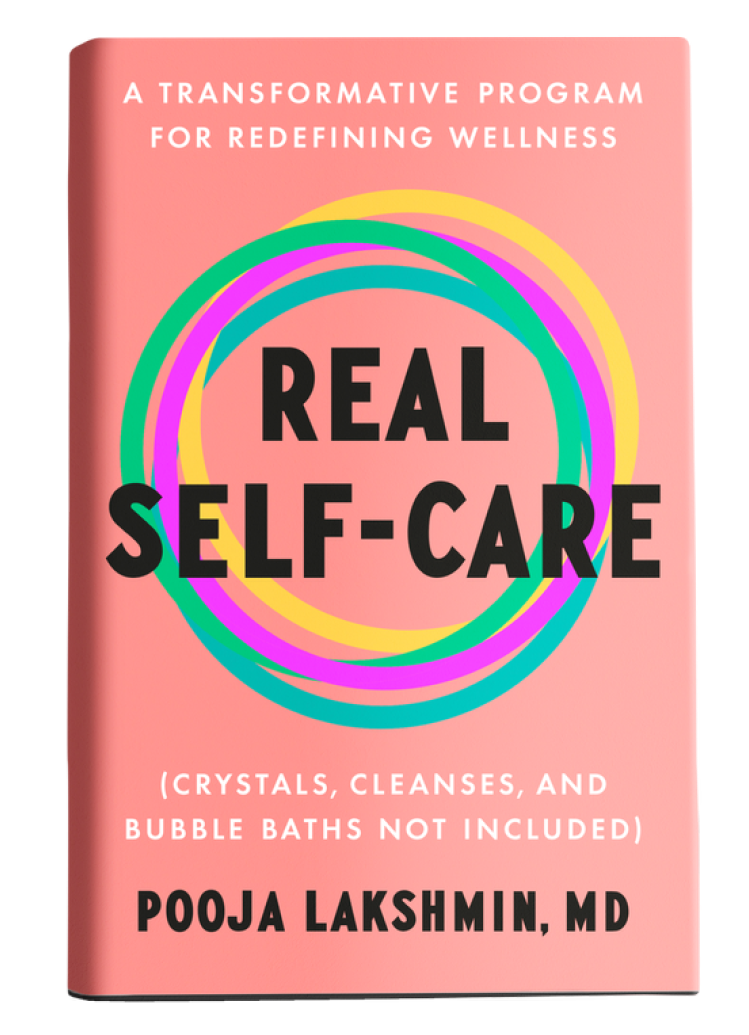I’m one of those people who will pause a podcast I’m listening to and go buy whatever book the person being interviewed has just written. The most recent time I did this was…yesterday. It was while I was listening to Tressie McMillan Cottom interview Dr. Pooja Lakshmin, author of Real Self-Care, about the prevalence and problematic nature of “faux self-care”: the mostly consumerist external rituals and indulgences that we misguidedly try to use to do the harder, subtler, long-term internal work of actual self-care.
You can listen to the interview for more details. To grossly simplify, Dr. Lakshmin breaks real self-care into four practices in service of preventing stress, burnout, and other kinds of emotional and psychological distress:
Setting boundaries
Practicing self-compassion
Aligning your values [to your actions]
Exercising power
You might notice there’s nary a yoga class or skincare routine in sight. Dr. Lakshmin repeatedly refocuses the narrative not on what individuals are or aren’t doing to "succeed" at self-care, but rather the biased, broken, oppressive systems and norms that make such care necessary in the first place—systems exonerated by the idea that we all just need to Soul Cycle and meditate and juice cleanse our way back to equanimity instead of, you know, getting guaranteed access to healthcare and child care and parental leave and normal wage increases. Aromatherapy candles don’t actually combat late-stage capitalism. Go figure.
Toward the end of the interview, Dr. Lakshmin says something that immediately struck me as relevant to what we’re talking about in this newsletter every week:
“Especially in terms of work, having to relitigate my boundaries and what my values [are], the shifting priorities, is always changing. [...] You can use those values words and tie them to professional relationships, professional achievements, and accomplishments and kind of think about [...] what am I most proud of? Why am I most proud of it? It’s not like a checklist, like a goal type of thing. It’s much more about the quality of what you engaged in, how you showed up, why it matters, and moving from that place.”
~ Dr. Pooja Lakshmin, author of Real Self-Care
Want to grab a copy of Real Self-Care? We’re doing a giveaway! Comment your thoughts on this post below and/or share this post on LinkedIn and tag Bonfire to be entered. We’ll randomize your names to choose a winner, and we’ll announce it in next week’s newsletter!
Creativity as self-care
As I heard more about these real self-care practices—especially setting boundaries and exercising power—my gears started turning about how this might apply to creativity. After all, part of a creative practice—an intentional way of working that supports your creative identity and expression—is setting boundaries in order to protect the time and space you need to be creative. And creative expression is, in many ways, about exercising power, meaning: you have to believe that the thing you’re expressing a) is valid enough to be expressed, b) should be expressed by you specifically, and c) should be expressed in the particular manner of your choosing. And that’s a powerful belief! In other words, developing a creative practice is one way to be more connected to “the quality of what you engage in, how you show up, why it matters,” as Dr. Lakshmin puts it.
Anyway, I got really excited about the idea of creativity/creative practice as a form of self-care—real self-care!—especially since we’re all about harnessing creativity to live a more engaged and meaningful work life, where work is, in fact, the “classic” source of stress and burnout. So this week, I wanted to explore not only that idea but also the ways in which it might be exploited or “Goopified” (as McMillan Cottom says in reference to Gwyneth Paltrow’s oft-parodied woo-woo wellness brand). In the same way that other kinds of self-care have been commercialized and rendered merely gestural, in what ways could applying creativity/a creative practice at work become problematic?
Creativity vs. Toxic Productivity
This whole topic deserves a much deeper dive, but let’s just start with this: When the explicit goal is profit, the system optimizes for profit. This is called, you know, business. Capitalism does what it says on the tin. “Capitalism gonna capitalize.” Under capitalism, it’s important to be aware that ideas like self-care and wellness and creative practices can be co-opted and “weaponized” by our work culture for the purposes of increasing productivity and efficiency. And while increased productivity and efficiency and “more valuable” work products are certainly possible outcomes of developing a creative practice at work, I want to urge you to be keenly cognizant of why you’re developing this practice and to jealously guard its benefits to be primarily for you and your fellow humans.
Why? Because otherwise, it contributes to toxic productivity culture.
I like this definition from BetterUp:
Toxic productivity describes the drive to produce while neglecting other important aspects of our lives.
We often attribute this mentality [...] to Western corporate culture. Productivity equals revenue, so companies want employees to value it as much as they do. This frame of mind is considered toxic because it’s culturally contagious.
The more a society promotes overworking as valuable, the harder people work.
What’s wrong with valuing overwork? Western corporate culture would certainly have you believe that doing so is the secret to “getting ahead.” You gotta hustle! Prove your dedication! You’ll be first in line for promotions and raises! The better the company does, the more everybody gets paid!
Uh-huh. Sure.
We can look at the numbers and see that this simply isn’t true. From the Economic Policy Institute (emphasis mine):
Net productivity grew 59.7% from 1979-2019 while a typical worker’s compensation grew by 15.8% [...] This divergence has been primarily driven by intentional policy choices [...]
During this period, 90% of U.S. workers experienced wage growth (26%) far slower than the economywide average, while workers in the top 1% [...] saw 160% wage growth (Mishel and Kandra 2020) and owners of capital reaped large rewards made possible only by this anemic wage growth for the bottom 90%.
Just to summarize: For the last 40+ years, growth in productivity has far outpaced the growth in average compensation for the bottom 90% of wage earners on purpose; meanwhile, the top 1% and business owners have made out like bandits.
If you want to read more about wage stagnation (in the U.S.) because you like being upset, give this a read.
I’m not saying that every company individually is like this, but our larger culture is certainly like this. And I’m also not saying “don’t be productive” or “don’t work hard.” But I am saying to think critically about who or what actually benefits from your productivity and whether or not that person or organization is paying you a competitive living wage and/or offering equity options, or if instead they’re just pretending that getting a new coffee machine for the office and giving you a $5 Starbucks card on your birthday means that they’re “taking care” of you. (Wait wait, caffeine…makes you…more productive… ::galaxy brain meme::)
In the same way that the proliferation of faux self-care obscures the underlying systemic causes of stress and burnout, corporations often proffer Bandaid benefits and “culturally contagious” (but semantically slippery) ideals to normalize, lionize, and celebrate overwork. Seriously, who hasn’t worked somewhere where a company value like “Ownership” or “Proactivity” was used to justify why you should be succeeding without all the necessary resources and support?
Look, I’m not going to pretend that this isn’t a complicated dynamic. Having ultimate choice and authority over the type of work you do and how you do it is an extreme and rare privilege. Likely, you’ll see this tension crop up again and again in this newsletter. If you want to develop your creative practice in order to be more productive or efficient or stand out and impress in a professional setting, do it. Do it! But do it for you. Go for you-productivity vs. them-productivity. Do it because it will increase your own satisfaction, fulfillment, and engagement with your work. Because it will make your own life more meaningful. Because it will be more freaking fun. And who doesn’t want that?
Don’t forget to enter our giveaway for a chance to win Real Self-Care! Comment your thoughts on this post below and/or share this post on LinkedIn and tag Bonfire to be entered. We’ll randomize your names to choose a winner, and we’ll announce it in next week’s newsletter!
In case you missed it…
You can check us out on Ramli John’s Marketing Powerups podcast! You can also read his Substack here.
For more…
Follow us on LinkedIn and on Instagram. Stay tuned to our Substack space for new community features and ways to meet your fellow subscribers.
And let us know if you’d like to go deeper with us to talk about you and creativity. We do:
1:1 coaching and mentorship 🤩 most popular 🤩
Team workshops and consulting for marketing and leadership
Speaking and appearances on podcasts and at events








Boy, did this speak to me! At various jobs, it has felt like I'm the only one who can see toxic productivity (and toxic positivity) for what it is.